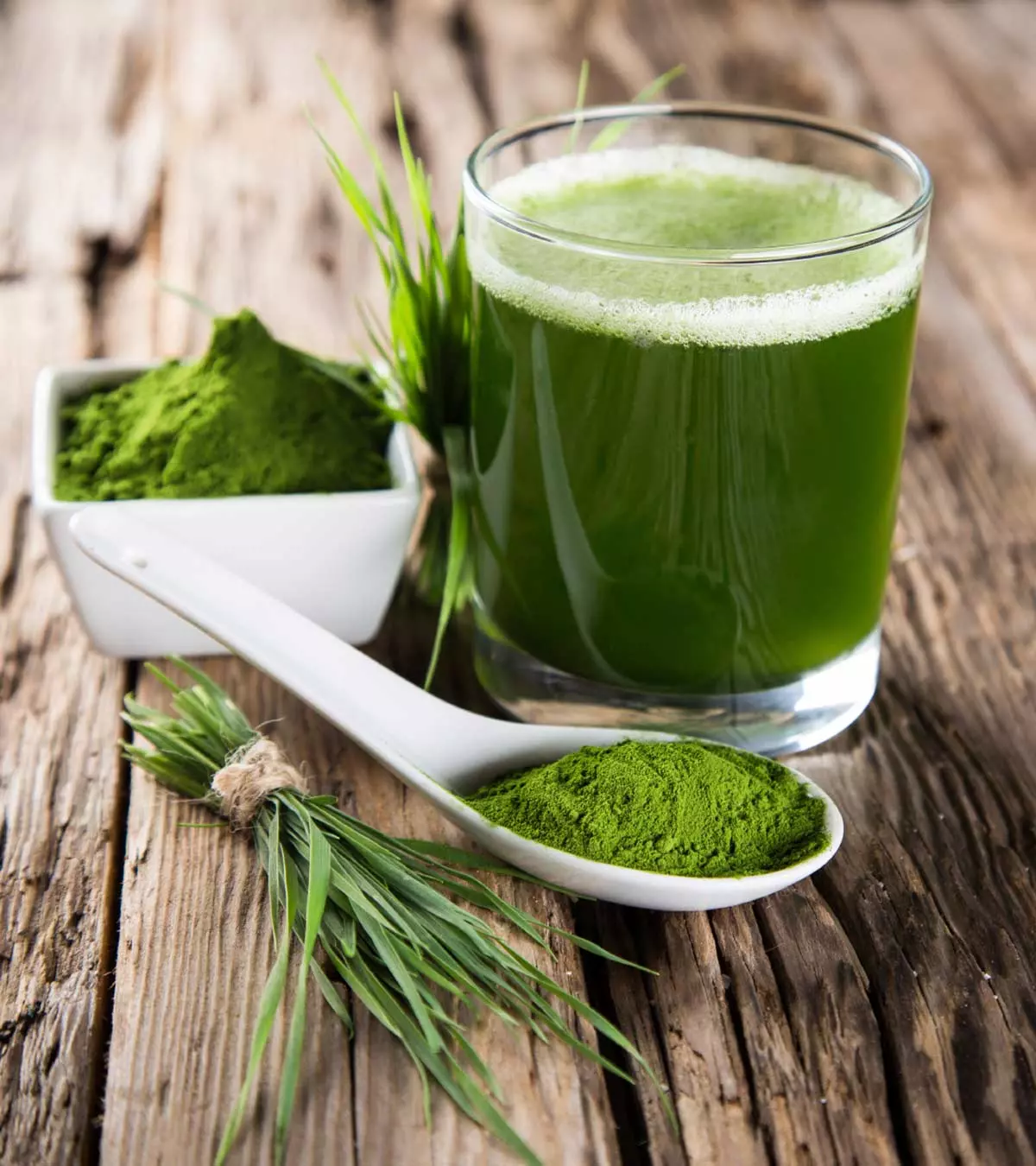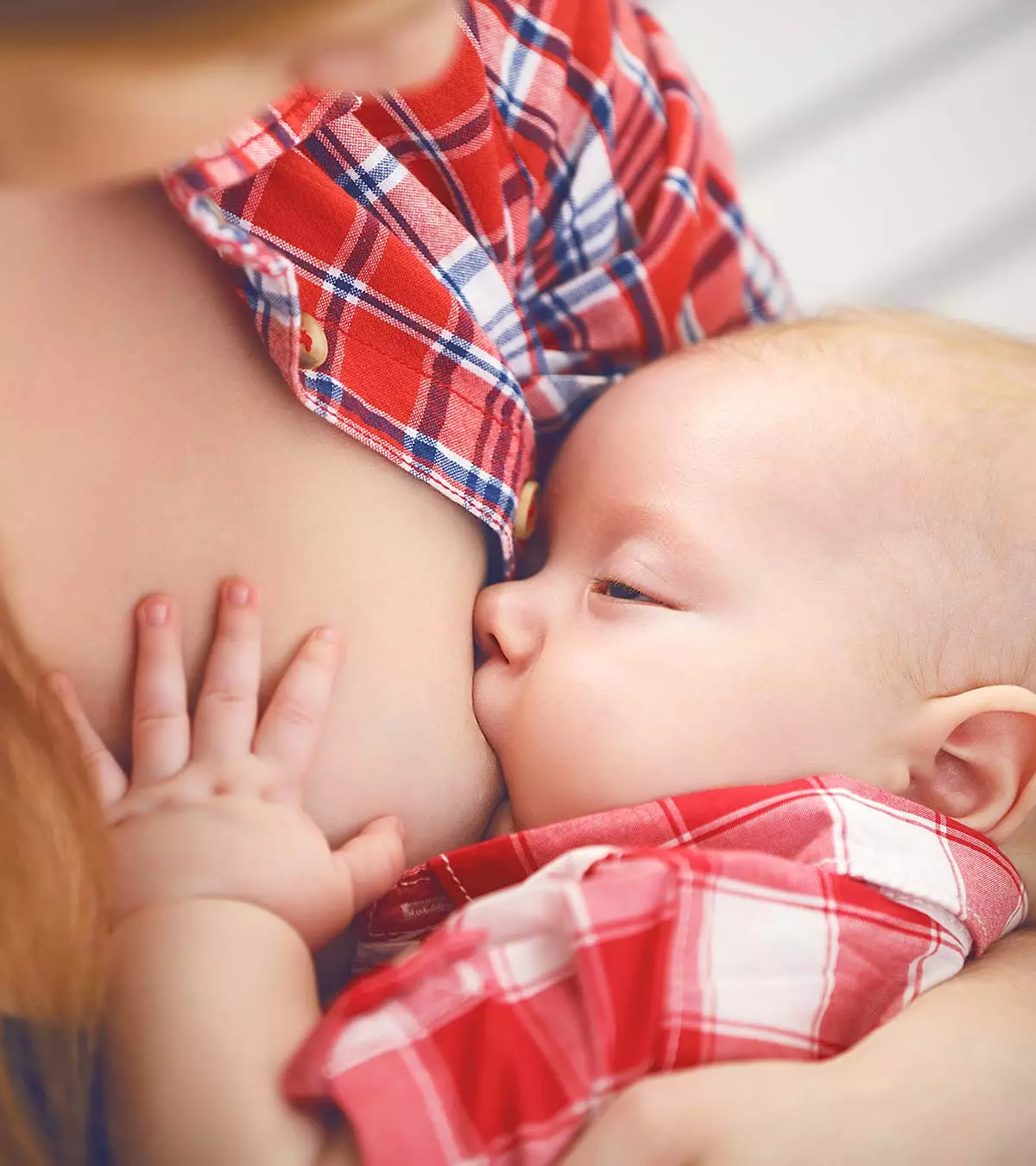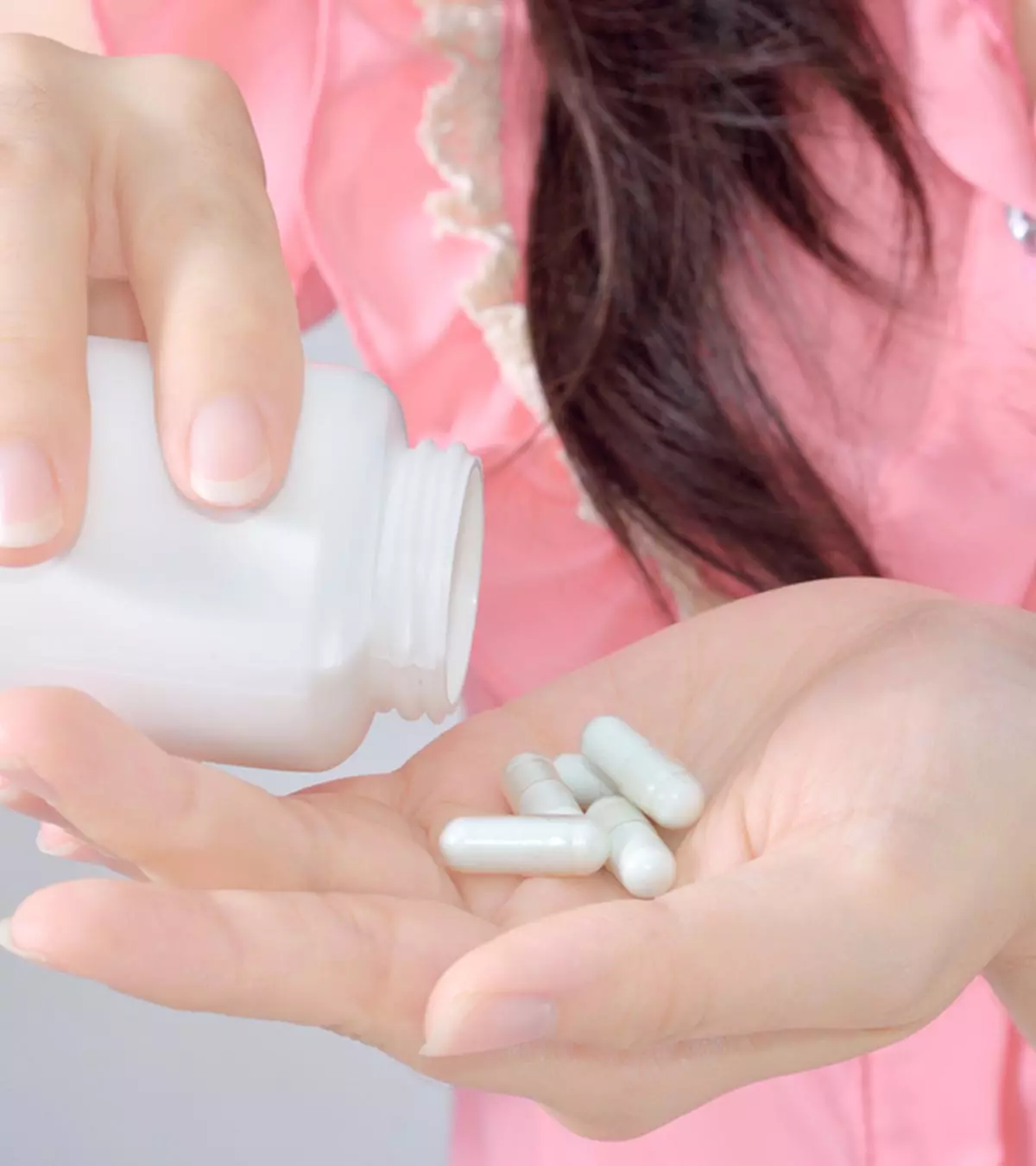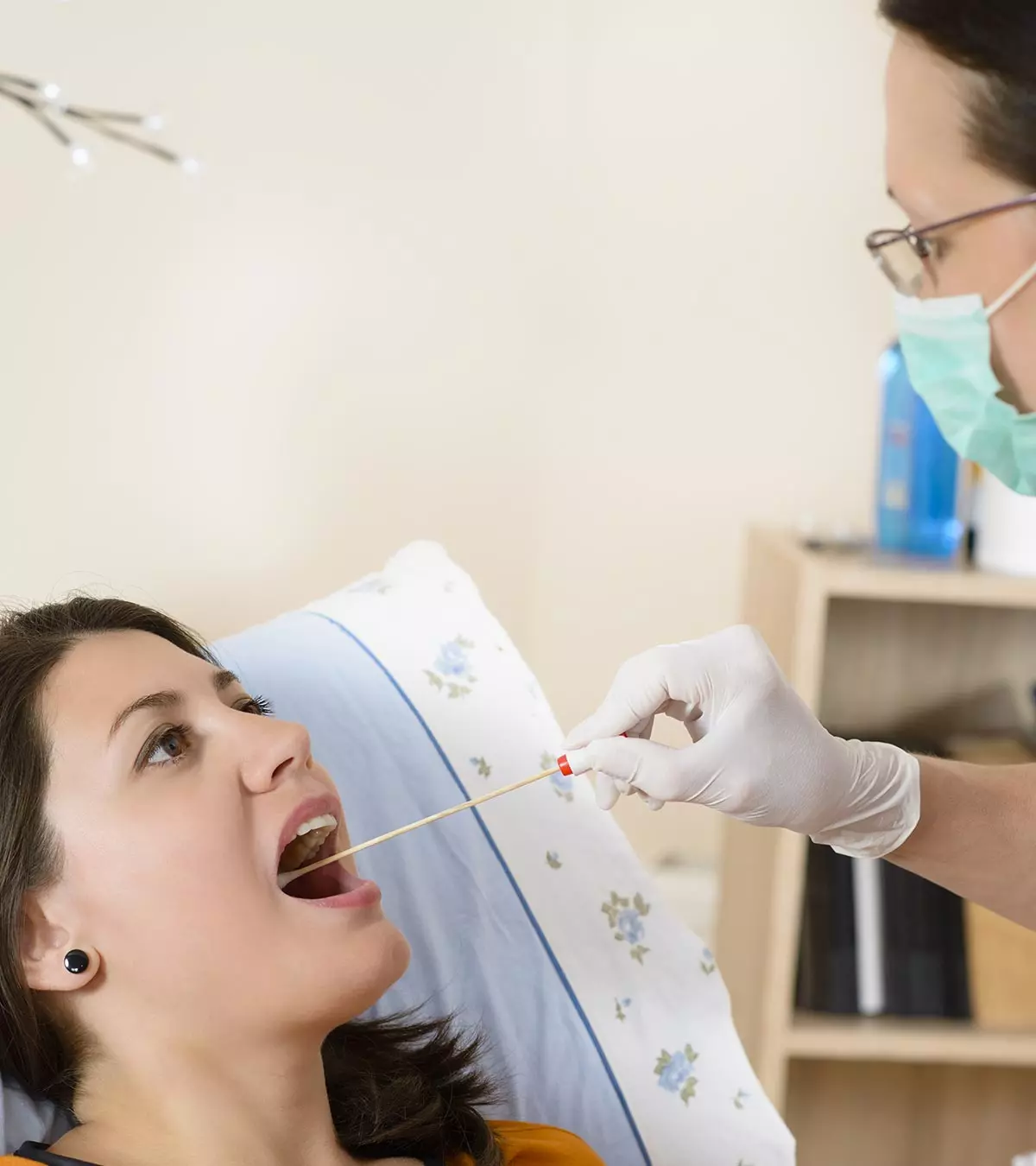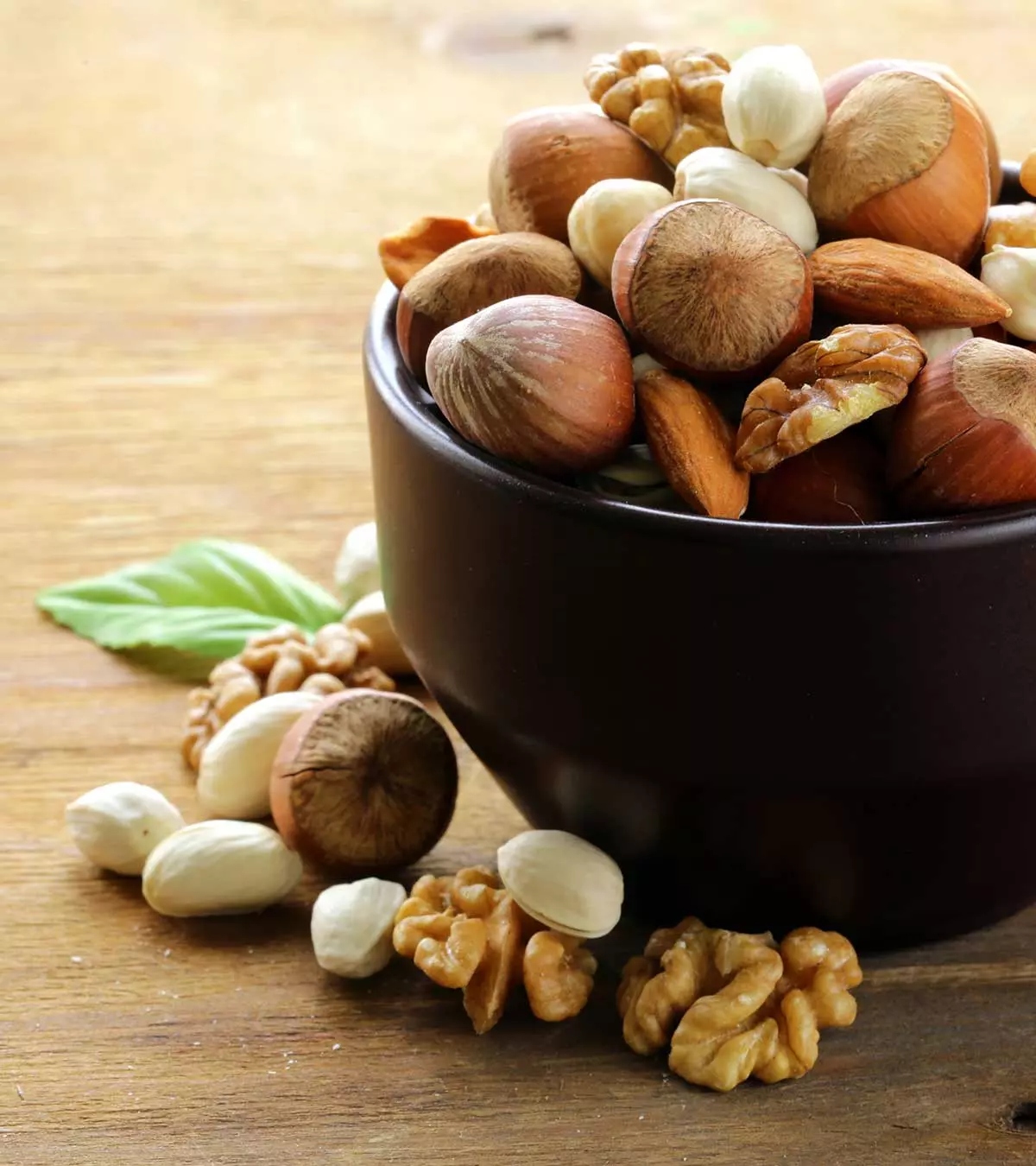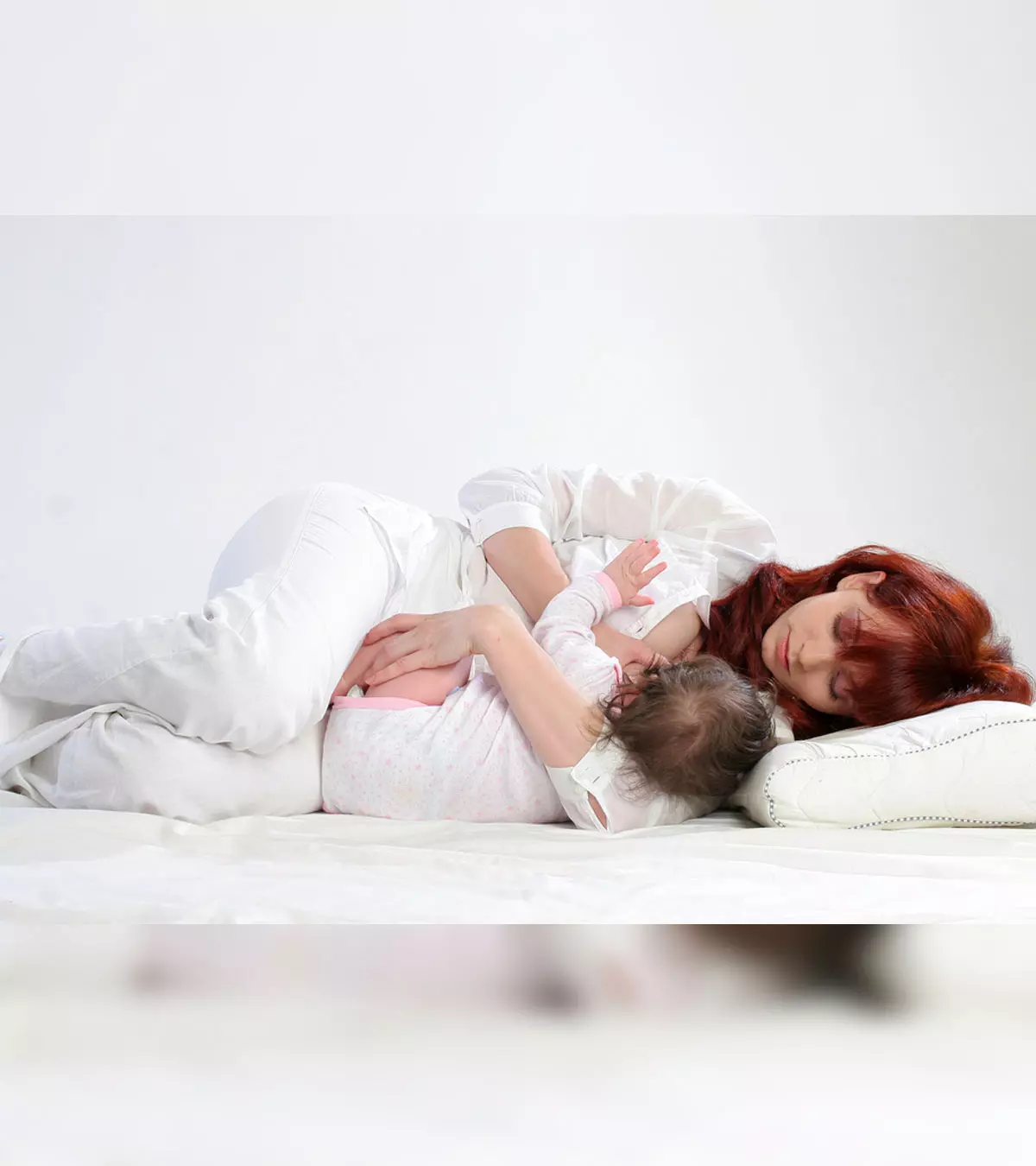
Image: ShutterStock
Tingling in breasts is one of the changes your body goes through during pregnancy to accommodate the baby. Even before you give birth, your body prepares your breasts for breastfeeding. Breast milk will be your baby’s sole source of nutrition during the first six months of their life. Therefore, breast milk is produced in the alveoli continuously, stimulated by hormones. This could be the cause of the tingling sensation in your breasts. Tingling in breasts can also be affected by emotional changes such as stress, anxiety, or excitement, which may heighten the sensitivity of breast tissue. Read this post to know why your breasts tingle during breastfeeding, if it is normal, what creates this sensation, and how to deal with it.
Key Pointers
- Tingling in the breasts is a common symptom experienced by women during pregnancy.
- This is caused by an increase in blood flow and hormonal changes in the body.
- However, breast tingling can also be a sign of breast cancer or infection.
- Therefore, it is important to consult a doctor if you experience excessive or repetitive tingling in the breasts.
What Causes Tingling In Breasts While Breastfeeding?

Tingling in the breasts is caused by the milk ejection reflex, which is also called milk let-down (1). The sensation feels like “pins & needles,” and it is one of the first signs that the milk is released (2). Breasts may also feel warm or cold during milk let-down.
Consultant obstetrician and gynecologist Dr. Shashwat Jani explains, “Hormonal changes contribute to breast tingling by stimulating nerve endings, causing breast tissue swelling, and affecting neurotransmitter levels.” Milk ejection reflex occurs when the pituitary glandiIt is a pea-sized gland responsible for maintaining hormonal balance in our body releases two hormones namely prolactiniAlso known as Lactotropin, is a hormone responsible for the production of milk and the growth of breast tissues. and oxytociniIt is a hormone that helps in reproduction, childbirth, and social bonding. . Prolactin stimulates breast milk production, while Oxytocin causes the milk ducts to contract and release the milk. The ejection of the milk down the ducts is called milk let-down (3).
Several physiological changes in the breast tissue during milk letdown can lead to tingling within the breasts.
 Did you know?
Did you know?Is It Normal For Breasts To Tingle During Lactation?

Yes. Most breastfeeding moms experience tingling due to milk let-down. However, tingling in breasts could happen due to other reasons as well.
What Other Reasons Cause The Tingling?

California-based childbirth and breastfeeding educator Mindy Cockeram says, “Tingling in the breast is most often caused by the shortening and widening of the ducts during letdown. However, there can be other less common causes. If the tingling doesn’t stop after the first few minutes of a feed, consider consulting your care provider for further examination.”
Other factors such as an infection like mastitisiA painful infection of the breast tissue that causes inflammation, swelling, and redness. or thrush may cause tingling along with a burning sensation and pain in the breasts (mastalgia).
Tingling is often a direct symptom of a rare form of breast cancer called Paget’s disease of the breastiA rare breast cancer that causes eczema-like changes in the affected areas (4). Paget’s disease causes other symptoms like the reddening of the nipple and intense itching of the areola.
Tingling in the breast could also happen due to paresthesia which is the condition usually known as “pins and needles.” Studies done on breast cancer survivors indicated paresthesia as a common symptom experienced by those who had undergone some form of breast cancer treatment, such as mastectomy or percutaneous radiotherapy (14).
The other reasons for tingling in breasts are usually persistent while let-down reflex occurs in fixed cycles. Also, tingling due to milk let-down is less likely to be uncomfortable when compared to the tingling caused by an underlying health problem. But you may have to see a physician in some cases.
 Quick fact
Quick factWhen Should You See A Doctor For Tingling In Breasts?
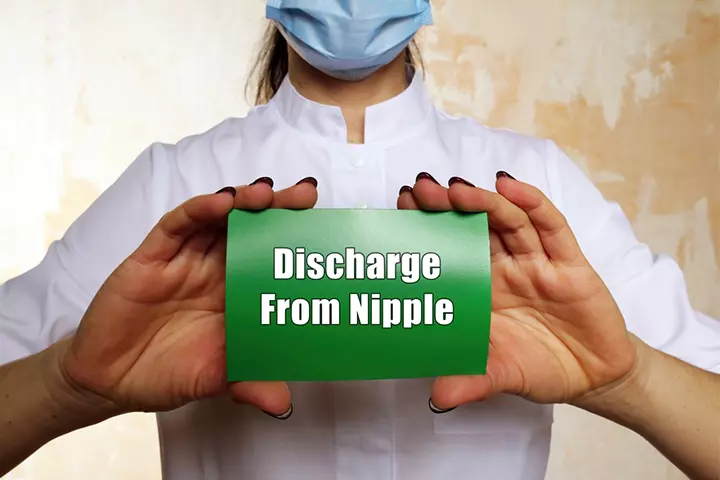
Dr. Jani advises, “In most cases, breast tingling is harmless. However, if accompanied by pain, discharge, or a lump, medical attention is necessary to rule out underlying conditions.” See a doctor when you have the following symptoms along with tingling in your breasts:
- Burning sensation
- Nipple ache
- Change in the shape of the nipple
- Heightened nipple sensitivity
- Reddening of the nipple; development of an eczemaiA skin condition characterized by dry, itchy, and inflamed skin -like rash on or around the areola
- Lump in the breast or dimpling of the breasts
- Nipple discharge; a non-milk liquid oozing out of the nipple
- Pain in the breasts
You must also see a doctor when you are unable to breastfeed due to the tingling sensation in the breasts. More often than not, tingling during lactation is a sign of milk ejection reflex instead of any other problem. Regular tingling due to the milk let-down is quite manageable right at home.
How To Manage Tingling Of Breasts At Home?
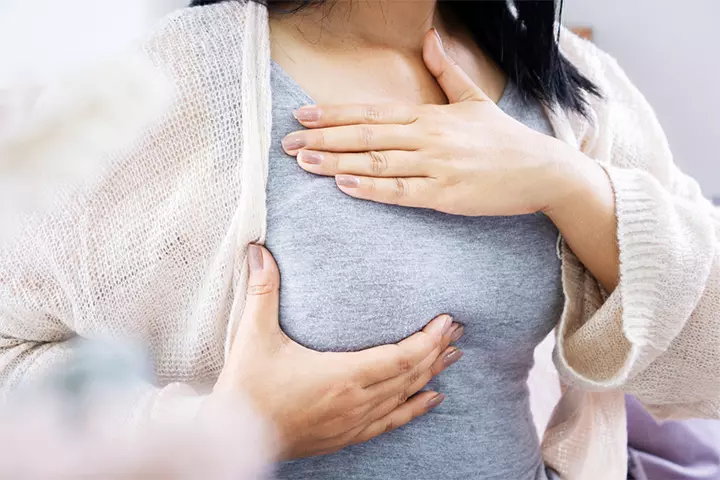
A few simple home remedies can help you deal with the tingling of the breasts:
- Use warm compress: Soak a clean towel in warm water and place it on the affected breast for five minutes. Warm compresses have a soothing effect on the breast tissue. Medical experts often recommend warm compresses and warm showers as a means to ease breast engorgement (5). A warm compress can thus help ease pins & needles sensation as well.
 Quick tip
Quick tip- Massage your breasts: Massage the breasts in straight, gentle strokes from the top of the breast to the nipple. You can also perform slow, gentle strokes on the breast itself. Studies indicate that lactation massage promotes the free flow of milk through the ducts and may help provide relief from tingling (15).
- Feed the baby as per schedule: Sometimes, the only thing you need to do is feed your baby as per schedule. Newborns always feed on demand, regardless of what time of the day it is. On an average, a newborn feeds about 8-12 times in 24 hours with an average gap of three hours between two feeds (6).
- Stay hydrated: Staying hydrated is essential for overall health, including maintaining adequate breast milk supply and reducing discomfort (16). Drinking enough water can help alleviate symptoms of tingling and promote milk flow. Shivani Patel, an obstetrician and gynecologist at The University of Texas Southwestern Medical Center, says, “I encourage women to carry a bottle of water in their diaper bag. When my children were babies, a friend told me to drink a glass of water every time I nursed. It was easy to remember to drink enough, and I pass that tip along to my patients (16).”
Try to establish a routine gradually. Once you have a fixed schedule, things get more comfortable. Your breast milk production and let-down align with the baby’s feeding pattern thus mitigating any discomfort caused by it.
Frequently Asked Questions
1. Should I pump every time my breasts tingle?
A tingling sensation in the breast signals milk ejection in mothers, which indicates the time for the baby to feed or the beginning of a feeding. In some cases, mothers may likely experience a strong let-down reflex, causing a tingling sensation and a rush of milk during and in between feedings. Oversupply can cause the breasts to feel heavy or full. It is best to express a small quantity of excess milk to relax the breast muscles. However, it is vital to remember that excessive pumping can drain the breast and increase milk supply further (7) (8).
2. Why do my breasts tingle when the baby cries?
Studies indicate maternal sensitivity to the baby’s cry results from brain activations responsible for mother-infant bonding. For example, the activation of the superior frontal gyrus, insula, precuneus, striatum, and amygdala was more significant in women who breastfed their babies. This activation, accompanied by the production of the hormones (responsible for lactation) oxytocin and prolactin in the mother’s body, and the psychological condition of an infant’s hunger response could be in synchronization with the milk let-down by the mother (9) (10).
3. Can tingling in breasts be a side effect of certain medications?
Medications such as those used in hormone replacement therapy, mental illness treatment, and birth control pills may cause tingling or breast pain during pregnancy (11).
4. What tests or examinations might a doctor recommend for someone experiencing tingling in breasts?
A breast examination is the first step conducted by the doctor, followed by several questions to understand the nature of the breast tingling or pain. A mammogram or an ultrasound may be suggested for further diagnosis (11).
5. Are there any lifestyle factors that can contribute to tingling in the breasts?
Factors such as high caffeine consumption, smoking, and stress may increase the risk of breast tingling or pain and cause discomfort (12).
6. Is it common to experience tingling in only one breast, or is it usually both?
Both non-cyclical and cyclical breast pain or tingling may happen in either or both breasts due to fibrocystic changes in the breast tissue (13).
Tingling in breasts often occurs due to the milk ejection reflex when you have a breastfeeding baby. The hormones and milk duct stimulation cause the pins and needles sensation (paresthesia), and it is seldom a cause for concern or a source of discomfort. However, other underlying health conditions such as infections or Paget’s disease may also be responsible. Check with your doctor if tingling is causing you discomfort or is associated with other symptoms such as a lump, discharge, or burning sensation.
Infographic: Can Tingling In Breasts Indicate Something Serious?
Tingling in the breasts is often experienced due to pain, which can be due to various reasons. Some conditions, such as hormonal imbalance, may cause cyclical pain, and other issues may cause non-cyclical pain or tingling. Go through the infographic to learn facts about breast tingling. Illustration: Momjunction Design Team
Did you experience tingling while breastfeeding? Tell us how you dealt with the condition in the comment section below.
Illustration: What Causes Tingling In Breasts And How To Deal With It?
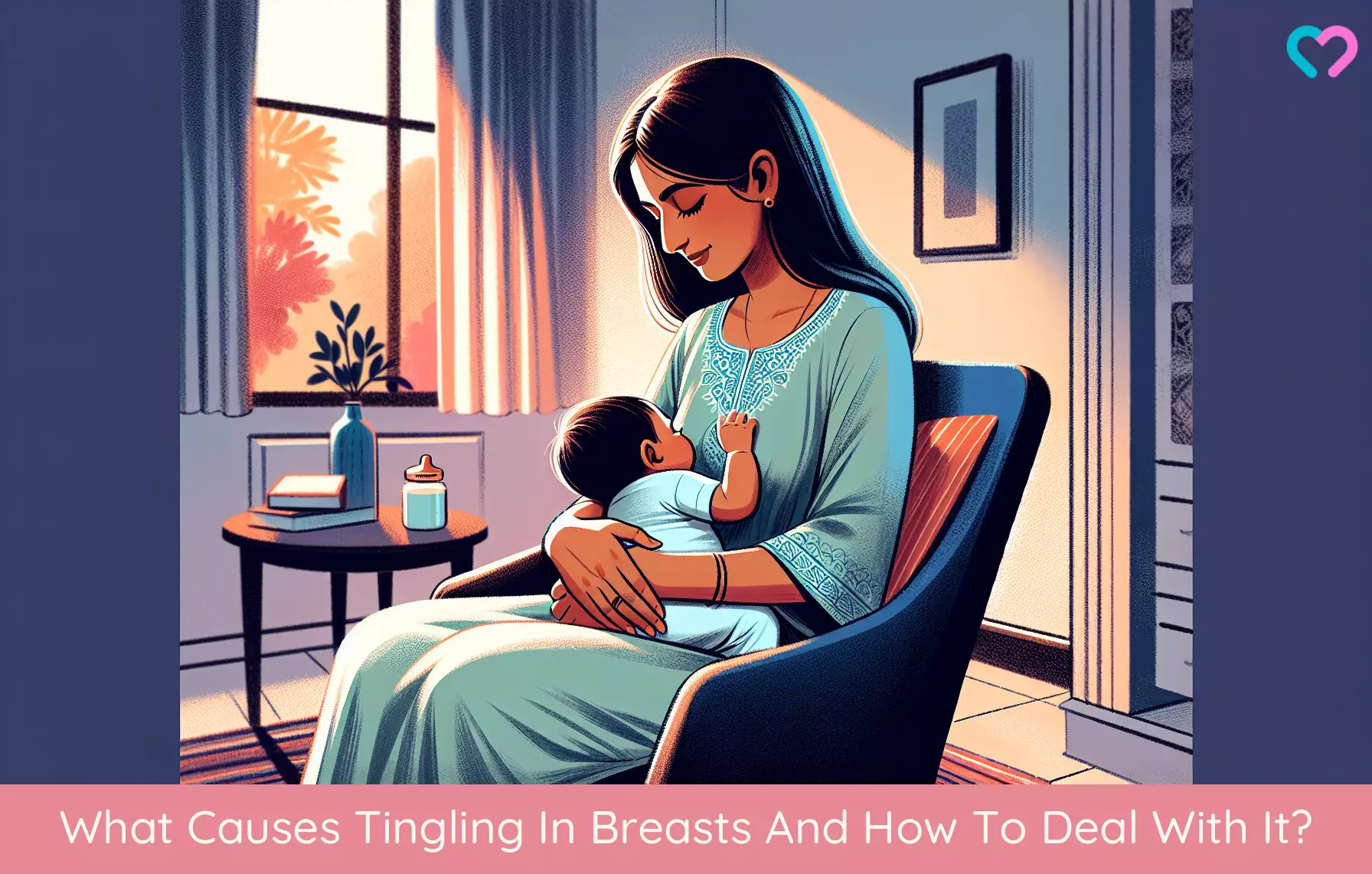
Image: Dall·E/MomJunction Design Team
References
1. Breastfeeding; University of Chicago
2. Transitional milk and mature milk; Healthy children
3. Breast Milk Production; Sutter Health Network
4. Paget Disease of the Breast; National Cancer Institute
5. S Arora, M Vatsa, and V Dadhwal; A Comparison of Cabbage Leaves vs. Hot and Cold Compresses in the Treatment of Breast Engorgement; Indian J Community Med.(2008)
6. How Often to Breastfeed; Sutter Health Network
7. Your Guide To Breastfeeding; OWH, U.S. Department of Health and Human Services
8. Breastfeeding Your Baby; UNM Hospital
9. Apparent Telepathy Between Babies and Nursing Mothers – A Survey; Sheldrake
10. Breastfeeding, Brain Activation to Own Infant Cry, and Maternal Sensitivity; NCBI
11. Breast pain; Medline Plus
12. Breast Pain (Mastalgia); Cleveland Clinic
13. Breast pain: Not just a premenopausal complaint ; Harvard Health Publishing 14. Sebastian M Jud et al.; (2014); Comprehensive visualization of paresthesia in breast cancer survivors; NCBI 15. Katmini and Nazilatul Maulinda Sholichah; (2020); Lactation Massage for Increasing Breast Milk Production in Postpartum Mothers; Journal for Quality in Public Health 16. 4 factors that can decrease breast milk supply – and how to replenish it; The University of Texas Southwestern Medical Center
Community Experiences
Join the conversation and become a part of our nurturing community! Share your stories, experiences, and insights to connect with fellow parents.
Read full bio of Melissa Kotlen
- Dr. Shashwat Jani is a consultant obstetrician & gynecologist in Smt. N.H.L. Municipal Medical College, Ahmedabad. He has 14 years of experience with a special interest in high-risk pregnancy, infertility, and endoscopy.
 Dr. Shashwat Jani is a consultant obstetrician & gynecologist in Smt. N.H.L. Municipal Medical College, Ahmedabad. He has 14 years of experience with a special interest in high-risk pregnancy, infertility, and endoscopy.
Dr. Shashwat Jani is a consultant obstetrician & gynecologist in Smt. N.H.L. Municipal Medical College, Ahmedabad. He has 14 years of experience with a special interest in high-risk pregnancy, infertility, and endoscopy. - Mindy Cockeram is a board-certified lactation consultant and runs her private practice in South Carolina. She trained as an antenatal teacher with the National Childbirth Trust (NCT) in London, England and taught childbirth classes for the NCT and St Georges Hospital Trust. Later, she relocated to the US.
 Mindy Cockeram is a board-certified lactation consultant and runs her private practice in South Carolina. She trained as an antenatal teacher with the National Childbirth Trust (NCT) in London, England and taught childbirth classes for the NCT and St Georges Hospital Trust. Later, she relocated to the US.
Mindy Cockeram is a board-certified lactation consultant and runs her private practice in South Carolina. She trained as an antenatal teacher with the National Childbirth Trust (NCT) in London, England and taught childbirth classes for the NCT and St Georges Hospital Trust. Later, she relocated to the US.
Read full bio of Swati Patwal
Read full bio of Rohit Garoo
Read full bio of Anindita Ghatak












